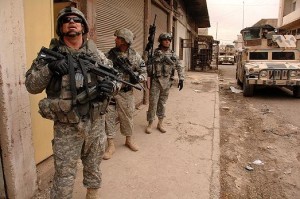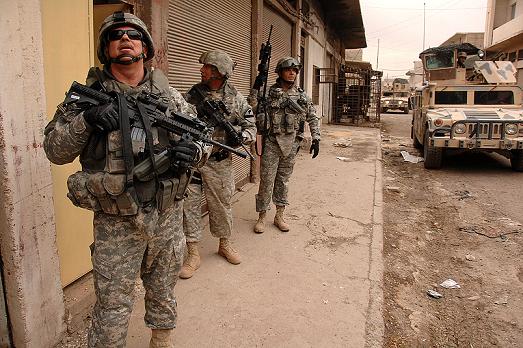Recently the Catholic journalist David Gibson has wondered whether the Christian just-war tradition might be a casualty of the conflict in Syria. Gibson points out that writers drawing on just-war reasoning have reached diametrically opposed conclusions on Syria, even those who share similar ideological commitments (he notes contrasting opinions in both First Things and the National Catholic Reporter). Gibson goes on to list several other “complicating factors” contributing to what Gibson, citing just-war scholar James Turner Johnson, calls the “chaotic just war discourse.” Although Gibson apparently concludes that the just war tradition lives on, he suggests that it exists in a state of confusion that hinders its effectiveness. I believe, however, that just-war reasoning is as healthy as ever, and that Gibson misreads the current state of the tradition.
First, many of Gibson’s “complicating factors” are pseudo-problems. For example, Gibson claims that “some leading Christian voices have increasingly moved toward a de facto pacifism that stands against war under any circumstance.” But pacifism has been part of the Christian tradition from the beginning, so it is unclear why its articulation today poses any new challenge to the just-war tradition. Just-war theorists and Christian pacifists have long engaged in a dialogue which has enriched and clarified the just-war tradition rather than confused it.
Gibson also notes that “the Catholic hierarchy in recent years has also seemed to migrate in the pacifist direction,” apparently putting just-war theorists at odds with ecclesial authorities. There is certainly truth in this observation, but recent popes and the U.S. Catholic bishops have also continued to teach that armed force could be justified in limited cases such as self-defense or a humanitarian catastrophe, using arguments drawn from the just-war tradition. Gibson cites as evidence of magisterial quasi-pacifism Pope Francis’s opposition to armed intervention in Syria, but considering that he had already mentioned that many just-war theorists had reached the same conclusion, this hardly signals a rejection of the just-war tradition.
Gibson goes on to claim that in some quarters the concept of “just peacemaking” is supplanting the just-war tradition. This is problematic in two ways. First, although some advocates of just peacemaking might see their work as an alternative to just-war reasoning, others see the two as complementary. The just-war tradition itself sees the resort to violence as a regrettable, if sometimes necessary, response to conflict, so if conflict can be mitigated through peacemaking efforts without resorting to war, then that is perfectly consistent with the just-war tradition. Second, Gibson writes that just peacemaking “is not as clearly articulated nor as readily applicable to real-world circumstances.” That may be the case if “real-world circumstances” are limited to the decisions of high-ranking government and military officials, but the number of groups and individuals around the world engaged in peacemaking, conflict resolution, and integral development demonstrates the real world applicability of the peacemaking concept, which in many cases proves more effective at promoting peace than do the efforts of political leaders.
 There are, however, real disagreements among advocates of the just-war tradition. For example, Gibson notes the disagreement over the legitimacy of “preemptive” war. One could also note disagreement over the authority of international institutions, in particular the United Nations Security Council, and the binding force of its decisions, a disagreement critical to discussions of not only Iraq and Syria, but also the NATO intervention in Kosovo in 1999. At a more abstract level, just-war theorists disagree over whether just-war reasoning begins with a “presumption against injustice” or a “presumption against violence,” which, at the risk of oversimplifying, means a disagreement over whether the responsibility of government authorities to protect innocent life or the responsibility to not take life has greater priority.
There are, however, real disagreements among advocates of the just-war tradition. For example, Gibson notes the disagreement over the legitimacy of “preemptive” war. One could also note disagreement over the authority of international institutions, in particular the United Nations Security Council, and the binding force of its decisions, a disagreement critical to discussions of not only Iraq and Syria, but also the NATO intervention in Kosovo in 1999. At a more abstract level, just-war theorists disagree over whether just-war reasoning begins with a “presumption against injustice” or a “presumption against violence,” which, at the risk of oversimplifying, means a disagreement over whether the responsibility of government authorities to protect innocent life or the responsibility to not take life has greater priority.
These disagreements, however, do not signal a just-war tradition in disarray, but rather quite the opposite. One problem with Gibson’s analysis is that he does not identify what the purpose of the just-war tradition is that it is allegedly failing to achieve. The article suggests, though, that he envisions it as providing clear, indisputable answers to policymakers. Although undoubtedly just-war reasoning would be a failure if it did not help political and military leaders make their decisions, it is a mistake to expect clear and indisputable answers. One can confidently assert that just-war reasoning, to draw on the thinking of Thomas Aquinas, is an exercise of the virtue of prudence, the virtue of dealing well with situations that present us with complex, ambiguous dilemmas. Similarly, the Methodist theologian Daniel Bell has recently written that the just-war tradition is better understood less like a checklist of criteria and more like an outgrowth of Christian discipleship. In this sense, then, disagreement is not necessarily a sign of weakness or confusion, but rather an ongoing process of discernment.
Likewise, the just-war tradition should be understood as what the philosopher Alasdair MacIntyre means by a tradition, a community of discourse over time. Its practitioners are bound together by a shared vision, but continuously disagree amongst themselves as their tradition encounters new developments in the world and engages with ideas from other traditions. With this in mind, it is only natural that there would be vigorous disagreement within the just-war tradition in response to the dramatic changes in international politics of recent decades, such as the development of a unipolar (or nearly unipolar) world, the acceleration of globalization, the rise of transnational actors, etc. In fact, disagreement is a sign of health, since lockstep agreement in the face of such a fluid reality would more likely signal the rigidity that arises from the failure to adapt rather than real clarity.
One last problem with Gibson’s portrayal of the just-war tradition is that whereas the disagreements within the tradition are quite visible, the much larger agreement on the ethics of war that it has helped bring about remains largely invisible. The just-war tradition has had a profound impact on the waging of war in the contemporary world. Many of the tradition’s principles have been embodied in the international laws of war, and just-war reasoning has further influenced many states’ cultural norms regarding war, to a greater or lesser degree. Limiting ourselves to the U.S. context, many of the pretexts that have led nations to war in the past would have no purchase in American politics, and likewise tactics that were accepted only within the past few decades, such as the carpet bombing of cities during World War II or the use of napalm in Vietnam, would be politically unpalatable today. Debates on when to engage in wars and how to fight them take place within a restricted range of options; the consensus that exists, in part through the influence of the just-war tradition, is hidden from view precisely because it involves decisions that are no longer viable options.
The disagreement within the just-war tradition itself also covers a limited range of issues, considered in relation to the tradition’s own past. For example, the medieval theologian Thomas Aquinas, a formative figure in the just-war tradition, only considered three just-war criteria: it must be waged by a legitimate authority, the war must be in response to a real injustice, and it must be waged with a right intention. It is only beginning in the sixteenth century that just-war theorists began to seriously consider the effects of war on civilians, introducing principles meant to limit those effects.
Similarly, these theorists, such as the Protestant Hugo Grotius and the Catholics Francisco Vitoria and Francisco Suarez, taught that a just cause for war could include self-defense of one’s own nation, punishment for the wrong-doing of another nation, and the restoration of property. Just-war theorists today, however, are almost completely unanimous in limiting a just cause to cases of self-defense against aggression, whether that aggression be against one’s own nation or another, or by a government against its people; even when arguments are made in terms of punishment, such as Barack Obama’s recent call to punish Bashar Assad for the use of chemical weapons in Syria, the crimes to be punished almost always involve aggression.
The debate over preemptive war seems to re-introduce the idea of justified wars of aggression, but even here we are talking about preemptive action against aggressive acts, such as the use of weapons of mass destruction. There is widespread agreement that certain causes for war are simply off the table, even causes that in earlier centuries would have been accepted by just-war theorists. One could argue that these more restrictive interpretations of the just-war tradition have resulted from the increasingly destructive potential of modern warfare rather than through any real progress in the tradition itself, but it is precisely through the use of ethical reasoning that just-war theorists have revised and limited the tradition in light of these technological changes.
Therefore, as a tradition of discerning the appropriate response to conflict, the just-war tradition is in good health. As the continuing conflicts in the Middle East, Africa, and elsewhere demonstrate, however, the endeavor to bring moral and legal norms to bear on conflict remains as precarious as ever.




The Just War theory is only a man made theory, it is not in the gospel and has never been a defined doctrine of the Church. It is contrary to the teaching and practice of Christ who taught and practiced non-violence. It is contrary to the principle that one may never do evil that good result, as a decision to do violence to another human person is always evil. We are supposed to love our enemies, not do violence to them.
God Bless
Chris,
You have every reason to point to the example of Christ as a serious challenge to just war thought. However, the just war tradition has been consistently affirmed (along with practices of non-violence) by the Catholic Church as part of the incredibly complex challenge of living in a world that is adversely affected by sin (For example, see http://old.usccb.org/sdwp/international/TheChallengeofPeace.pdf). The tradition recognizes that war is certainly not good, but that it can be in rare cases a way to fulfill Jesus’ command to love our neighbors. Augustine even talks about it as a love of enemy (albeit a tough love), because it is ultimately aimed at restoring order and right relationships in this world, including between parties on opposing sides of the fighting.
Peace,
Nick
Dear Mr Shadle,
Thank you for your post highlighting the problem of Just War Theory. However I think it important to bring to your attention certain issues of misrepresentation.
Firstly, you make only one brief reference to the theory – “Just War Theorists”. The rest of your article, one could be led to believe, that Just War is fact. Like Mr Sullivan pointed out, there is a theory of Just War. But when a theory is put into practice and shown to be unacheivable, as St Augustine (the developer of St Ambroses original theory of a Just War) pointed out, scientific process would prove the theory fallacious and cast it out.
Secondly, there is a misrepresentation of the Church’s teaching on Tradition. In no Church document, nor any Papal teaching, has it ever been stated that a Tradition of the Church supersedes Scripture. Scripture scholars are unanimous that Christ condemned violence and enmity unilaterally. Tradition, as the Catechism of the Catholic Church points out, is where “75 “Christ the Lord, in whom the entire Revelation of the most high God is summed up, commanded the apostles to preach the Gospel, which had been promised beforehand by the prophets, and which He fulfilled in His own person and promulgated with His own lips. In preaching the Gospel, they were to communicate the gifts of God to all men. This Gospel was to be the source of all saving truth and moral discipline.”” The theory of Just War is not a Tradition of the Catholic Church, for it cannot be reconciled with the New Commandment that the Divine Redeemer gave to His Church. It is misrepresentative to call it a tradition, because of the likelihood to equate the same word with Sacred Tradition, rather it is a school of thought.
Thirdly, there is a misrepresentation of Christ. 1. You seem to present a suggestion that there is a choice, when it comes to Christ’s unanimous condemnation of violence and enmity. 2. You seem to present Christ and his “pacifist” followers in the modern understanding of “Pacifism”. This is far from the Gospel Truth. Christ was not “Pacifist” in the face of evil. Rather He demonstrated to the end of His life, His action of bringing the power of Good directly up against violent murderous evil. His whole life and preaching was an active mission to tackle evil with Good, as the means of bringing about Salvation.
I would strongly recommend that you familiarise yourself with the Nobel Peace Prize nominee Father Emmanuel McCarthy, who has gone to great pains to counter the oft-repeated misrepresentations, with unerring reference to the Church’s Tradition, Sacred Scripture and both modern and ancient exegesis.
– I would love to see if you could maintain your position in response to his section on Questions and Answers.
In particular he deals with the topic of Just War:
Thank you for your time. God bless you.